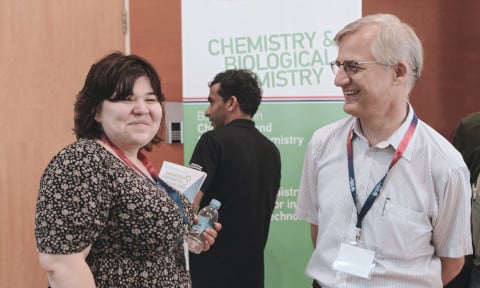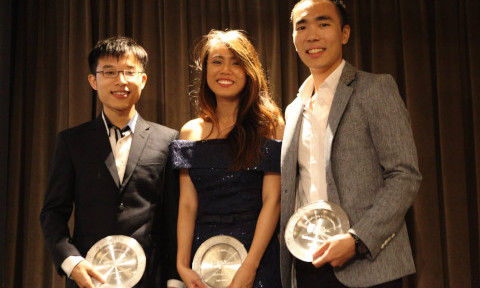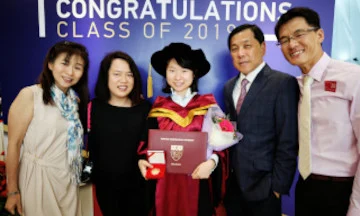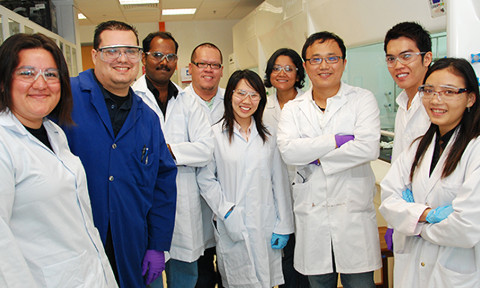The School of Chemistry, Chemical Engineering and Biotechnology (CCEB) is a new interdisciplinary school at NTU, inaugurated in August 2022 by integrating the Division of Chemistry and Biological Chemistry from the School of Physical and Mathematical Sciences with the School of Chemical and Biomedical Engineering. It is jointly run by the College of Science and the College of Engineering.
Our School hosts world-class education and research programmes in organic and inorganic chemistry, physical chemistry, chemical engineering, and bioengineering. We aim to nurture future-ready graduates with the ability to tackle new challenges in chemicals manufacturing, healthcare, energy, food, and other important sectors.
We offer a variety of undergraduate Bachelor of Science (B.Sc.) and Bachelor of Engineering (B.Eng.) programmes, as well as the newly launched Bachelor of Engineering Science (B.Eng.Sci), covering the academic areas of chemistry, chemical engineering and bioengineering. These programmes provide the foundation for a wide variety of intellectual domains encompassing different areas of fundamental science, engineering, and medicine. For postgraduate students, we also offer Ph.D., M.Sc. and M.Eng. programmes based on coursework or research.
Our Undergraduate Programmes
Learn More(NEW) Process Engineering and Synthetic Chemistry
This unique interdisciplinary programme in Singapore that combines Synthetic Chemistry and Process Engineering leads to a Bachelor degree in Engineering Science, which provides students with deep understanding of chemical processes, from molecular structures to industrial-scale production, empowering them to tackle complex challenges and foster innovative and sustainable solutions in various sectors such as pharmaceuticals, petrochemicals, energy, and materials. The curriculum is carefully designed to bridge scientific understanding and analytical skills with practical engineering applications, thus positioning students for leadership roles where they can oversee multidisciplinary projects and remain relevant in the rapidly evolving industrial landscape
Chemistry
Chemistry is the scientific discipline that seeks to understand how the chemical constituents of matter behave, and to use that understanding to harness chemicals in a variety of practical settings. Our programmes in Chemistry and Biological Chemistry begin with the fundamentals of modern chemistry, including organic and biological chemistry, inorganic chemistry, analytical chemistry, physical chemistry, and forensic science. Students then go on to study advanced topics such as organometallic chemistry, spectroscopy, green chemistry, and drug design.
Chemical and Biomolecular Engineering
Chemical and Biomolecular Engineering is the branch of engineering that deals with the process of converting raw materials or chemicals into more useful or valuable forms. This is accomplished by applying knowledge from the physical sciences (e.g., Chemistry and Physics), life sciences (e.g., Biology and Biochemistry), and other disciplines such as Mathematics and Economics.
In addition to producing useful chemicals and materials, modern Chemical and Biomolecular Engineering is also concerned with pioneering new technologies such as green energy and alternative proteins.
Bioengineering
Bioengineering is a new engineering discipline that uses recent advances in the biological sciences, including in genetics and molecular biology, to develop useful new technologies. Bioengineers are working on improved methods for diagnosing and curing diseases, better ways to manufacture drugs and other pharmaceutical products, and many other forms of biotechnology that will bring tangible benefits to society.
Our Research
We conduct research into a broad spectrum of topics in chemistry, chemical engineering, food science, biomedical technology, and other fields. Our facilities are equipped with state-of-the-art equipment, which are also available for use by other researchers in NTU and elsewhere. We are constantly striving to maintain an intellectually stimulating environment to foster world-class research.




















aa92ec64-ec84-468b-9ff2-23692f373bfd.tmb-listing.png?Culture=en&sfvrsn=f6d76307_1)











.tmb-listing.png?Culture=en&sfvrsn=6340b100_1)
/aa88746f-67b1-4e82-931f-727bf3e87ddfe2d63f4a-9fac-4e58-88dc-139180b50932.tmb-listing.png?Culture=en&sfvrsn=66ddd90a_1)


